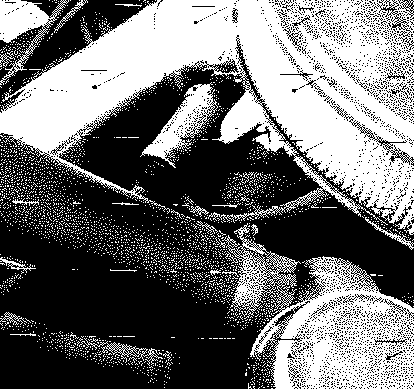
The engine is a detail of an Olivier Mosset cell phone photo; the noise came from a GIF posted by pfifferking.

The engine is a detail of an Olivier Mosset cell phone photo; the noise came from a GIF posted by pfifferking.
To: NEW INC Review Committee, New York, NY
From: Tom Moody
Re: Proposal for NEW INC incubator project
Date: March 10, 2014
Artist and earthworks pioneer Robert Smithson provided the original conceptual framework for the appreciation of "place" as art. In a "site specific" location, the art remains in situ and is visited by gallerygoers. In a "non-site," the artist collects artifacts from the site such as rocks or machinery and transports them into the gallery for display. My proposed SSLAPP app (Site-Specific Locator App) updates Smithson's ideas for the digital age, through the use of mobile devices and harnessing the power of social.
Informally, the SSLAPP app could be described as "Airbnb for Non-Sites." Your incubation funds will enable me to develop this smartphone app, which identifies potential "sites" and "non-sites" for artists, assists in the logistics of documenting these locations (including local procurement of materials, food, and lodging), and provides end-user logistical support for placement and display of the documentation in art spaces.
While SSLAPP's main function is the development of gallery non-sites, its algorithms can also be used to identify heretofore unknown "sites" and accommodate visitors. The app will be a valuable tool for artists but also the lay person interested in seeing the world as an artist does. It's hoped that the app will also have spin-off benefits, such as scouting locations for the tourist, entertainment, and advertising industries, and, ultimately, the revival of local economies.
I am asking for $50,000 to implement this project, in accordance with the attached budget.
To: Tom
From: NEW INC Review Committee
Re: SLAPP Proposal
Date: March 11, 2014
We are thrilled by your SSLAPP proposal and have fast-tracked it for immediate approval. We look forward to working with you, and seeing this wonderful idea enter the incubation process.
Nicholas O'Brien attempted to initiate some discussion of New Inc, the New Museum's incubator cube farm for artistes mentioned earlier. Mostly he got pushback from the "art and technology" sphere, along the lines of "how can you criticize it when it hasn't even started?" and some condescending speculation as to his motives from Sterling Crispin. Crispin unhelpfully reduced the argument to Turing vs Duchamp and opined that New Inc is mostly meant for residents of "Turing Land."
Struggling to get the conversation back on some reasonable track, O'Brien threw out some questions:
[A]gain what is the eventual audience for the products that get made this incubation of innovation? Is that audience the same as the rest of the museum? What will be the hopeful benefit from the cross-pollination between these communities that only a museum can provide? How do the strategies of innovation incubation funding effect the types of cultural production that will occur in this studio? How can artists in this space remain autonomous yet still "gain access"?
So I put in two more cents as O'Brien's sole unequivocal supporter (speaking up from the humanities side of the divide):
Your question "How do the strategies of innovation incubation funding effect the types of cultural production that will occur in this studio?" is the key one for me. I would phrase it: "is artistic innovation the same as invention of a product?" and say, no, it's not. The two can overlap but art is not science, or engineering. Crispin's "Turing vs Duchamp" polarity leaves out so much. The Duchamp rotoreliefs could be perceptual science, but the Large Glass is absurdist poetry - it's not about learning, earning, or making the world a better place. Where do Matta, Eva Hesse, or Oskar Fischinger fit into a Turing vs Duchamp scheme? To answer these questions you'd have to have strong opinions about art and willingness to laugh at the certainties of science. I don't see anyone with that mindset getting past the gatekeepers looking for innovation in the logical positivist sense. You would have to lie on the application form, which is what capitalism-averse artists routinely do to get Creative Capital grants.
In an earlier comment I noted some connections between O'Brien's questions regarding venture capital-funded art and Mark Ames' criticisms-in-advance of Glenn Greenwald's gazillionaire-funded investigative journalism outfit, First Look. Similar issues of intellectual autonomy are raised, and a similar veil of silence descended from "the community."